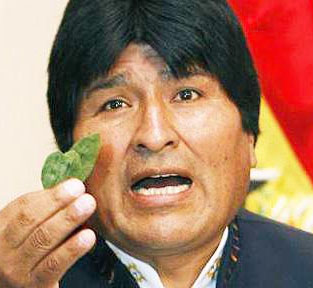VIENNA (Reuters) – Bolivian President Evo Morales yesterday defended Bolivians’ right to chew coca leaves, the main ingredient of cocaine, saying it was an ancient tradition and the world’s No 3 cocaine producer was working to fight drug trafficking.

Holding up a coca leaf to help underline his message at a United Nations anti-drugs meeting in Vienna, the leftist leader, a former coca leaf farmer, said coca leaf producers were not “drug dealers” and it was not the same as cocaine.
The coca leaf was declared an illegal narcotic in the 1961 UN Single Convention on Narcotic Drugs, along with cocaine, heroin, opium and morphine and a host of chemical drugs.
Bolivia has withdrawn from the convention but hopes to re-join with a reservation recognizing coca chewing.
It is unclear, however, whether it will secure sufficient support among other countries to be able to do that.
“We know that some countries already conveyed to us their strong opposition,” Yury Fedotov, head of the UN Office on Drugs and Crime (UNODC), told a news conference.Fedotov expressed concern that this kind of request from Bolivia, in the long run, could undermine international law in the area of drugs control and could have a “domino effect”.
Morales said that chewing coca leaves was an “ancestral right” for Bolivians.
“We are not drug addicts when we consume the coca leaf.
The coca leaf is not cocaine, we have to get rid of this misconception,” he said in a speech that ended with applause from the hall.
“This is a millennia-old tradition in Bolivia and we would hope that you will understand that coca leaf producers are not drug dealers.”
After Morales’ speech, thousands of Bolivian coca farmers rallied in city squares across the Andean country chewing coca leaves in support of the president.
“We want to tell the world that the coca leaf is (part of our) culture, our identity and that’s why we are asking for it to be removed from the blacklist of drugs,” said Roberto Coraite, leader of Bolivia’s largest agricultural workers confederation.
Bolivia, the biggest cocaine producer after Peru and Colombia, has been trying to promote coca’s health benefits and develop legal uses for coca leaves.
Bolivians have chewed the leaves for centuries as a mild stimulant that reduces hunger and altitude sickness, and Morales has asked the United Nations to decriminalize the traditional practice.
“We are very much aware of the damage that can be done by cocaine and we are working against drug trafficking … but we want the recognition of these ancestral rights,” Morales told the meeting in comments translated from Spanish to English.
The head of Russia’s Federal Drug Control Service, Victor Ivanov, spoke of the need to do “everything we can against legalising drugs,” when asked about his position on Bolivia’s campaign in favour of recognizing coca leaf consumption there.
R Gil Kerlikowske, the director of US National Drug Control Policy, said Washington “steadfastly opposes the legalization of drugs,” in a speech, but did not mention Bolivia.
Earlier, Fedotov said illegal drugs represented a “trans-national threat of extraordinary proportions,” as he opened the week-long Commission on Narcotic Drugs meeting.
